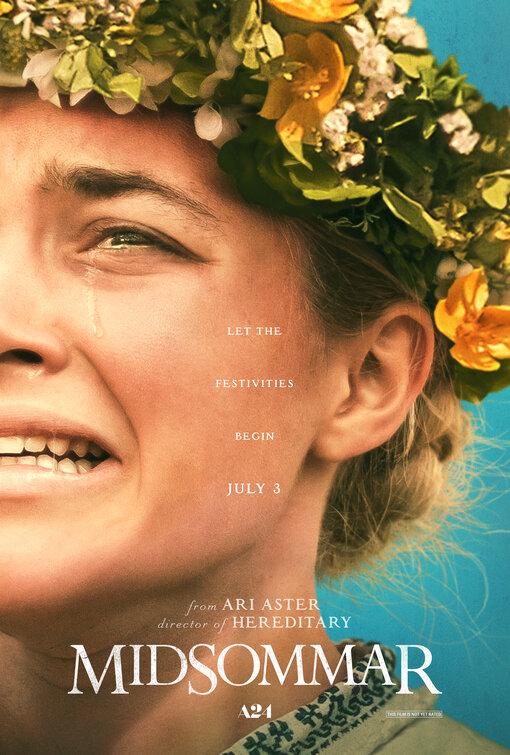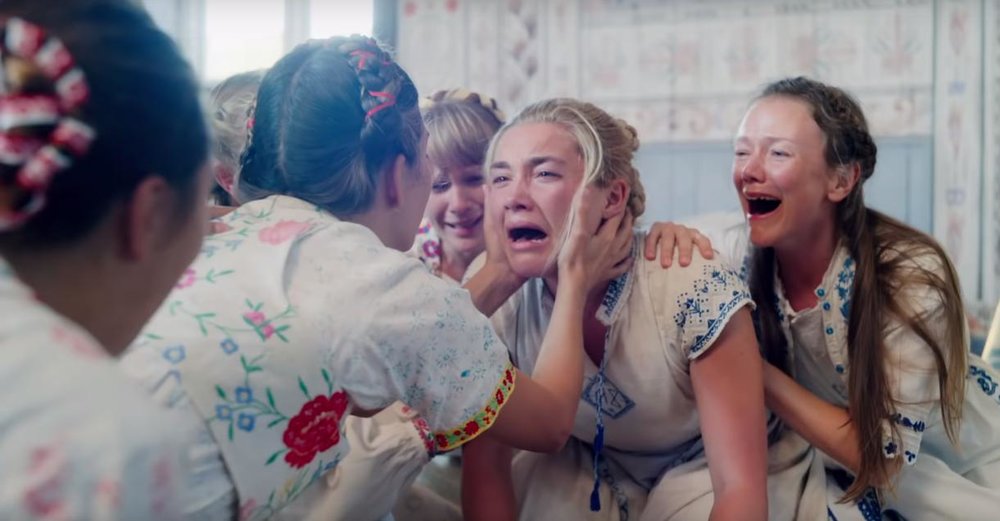Midsommar (2019)


SHOULD I SEE IT?
YES
If you are a fan of Hereditary, Ari Aster’s sophomore feature is going to be right up your alley.
Florence Pugh’s performance and Pawel Pogorzelski’s cinematography stand out as some of the finest work of 2019.
Full of content that pushes the boundaries of an R rating, Midsommar is not only one of the more daring mainstream movie releases of recent years, but it is also a movie that will have people debating, discussing, and analyzing its themes and stories for a long time to come.
NO
Audiences are not going to be ready for, at a minimum, the graphic, unflinching violent imagery on display here. Not for the squeamish whatsoever.
Aster fans will not want to admit this, but Midsommar is kind of an unrestrained mess and not as clever as it believes it is.
A divisive, polarizing film. Some will swoon over the aesthetic, tone, and atmosphere, others will check out with a methodical pace, characters who are hard to relate to, and a dizzying descent into chaos, madness, and emotional destruction. Not for everyone. You’ve been warned.
OUR REVIEW
Never let it be said that human beings don’t love the shiny, new object in the room. When often presented with something new or unique, we like to pick the object up, feel it in our hands, stare at it, discuss it, and even pass it around to others.
On occasion, our exuberance over this shiny, new object can be overblown, and once the newness wears off, it looks like just another ordinary thing. As we shift our thinking around what shiny and new means to us, we typically move on to the next new thing placed in front of us and repeat that cycle repeatedly.
After wowing audiences with 2018’s Hereditary, writer/director Ari Aster brings a new, shiny object in Midsommar, a divisive, curious film which will undoubtedly polarize its audience with graphic, visceral violence, bizarre imagery, confounding plot twists, and a methodical tone and pace.
If Midsommar is a shiny, new object for people to fawn over, than that analogy also applies to the characters Aster introduces to the idyllic Swedish countryside, which serves as the backdrop for his latest horror film.
Dani and Christian (Florence Pugh, Jack Reynor) are 20-somethings, struggling after several years of being together. Dani is reeling from a recent horrible family tragedy and is distraught, while Christian is torn with the idea of moving along to something new. His best friends want him to be single, but Christian cannot quite end things with Dani considering everything that has happened with her.
When Dani learns that Christian and his best friends from his graduate anthropology program are planning a retreat to Sweden, she is surprised. Christian, caught up in wanting to go but also recognizing Dani’s grief, invites her along at the frustration of his friends. The one friend not upset is Pelle (Vilhelm Blongren), a soft-spoken Swedish student who is leading everyone back to his family’s compound for a festival which occurs once every 90 years.
And so, everyone is off. Once Dani and Christian, with Pelle, and anthropology student Josh (William Jackson Harper) and the sarcastic, crass Mark (Will Poulter) arrive in Sweden, they dip into hallucinogenics and trip out for a bit before reaching the compound.
Aster flips conventional horror film practice, using darkness as a cloak of misery, and uses bright sunshine and daylight as a mechanism to disorient both viewer and character alike. Everything is visible and in front of us, degenerating to an increasingly odd, strange, but rather intoxicating foray into something audiences are not anticipating.
The nine-day celebration resembles a Renaissance fair, medieval roleplay vacation, and Swedish arts festival all rolled into one. In addition to Pelle’s guests, two other Londoners are invited, and the ragtag group of millennials all attempt to assimilate and make the most of their nine days together.

Aster, using a technique which others have used to great effect, is unafraid to show us everything early on. The camera finds quilts, murals, paintings, and other visual cues that will foretell the entire movie. Doing so, allows Aster to play games with the audience, inasmuch as wondering what we paid attention to and how prepared we are for what will come. His confidence in his cleverness can overwhelm Midsommar, but his fearlessness is also captivating to watch explored on screen.
Elements of other films are interpolated into the storytelling, but Midsommar’s greatest calling card comes with the astonishing cinematography of Pawel Pogorzelski, who finds every ounce of light and sunshine stripped away from the dark, imposing presence which enveloped Hereditary. A fascinating score from Bobby Krlic (credited under performance name The Haxan Cloak) blends morbidity, levity, and a sense of uneasiness which accentuates and enhances Aster’s tone and mood.
Pugh shines as Dani. The vast array of emotions she conveys, as things descend into unexplainable chaos, is one of the year’s finest performances. Around her, the ensemble complements her work exceptionally well, making the most out of what they are given as characters on a fateful journey to a confusing and increasingly dangerous place.
Lost in the wonderment of the aesthetics of Midsommar, is that when you really peel back what’s happening, the movie doesn’t work nearly as well as it thinks it does.
Outside of Dani, the characters are all one-dimensional, with two characters essentially arguing over who can out-thesis the other and another guy spitting frat-house bravado. We gain no sense of their worth, and as a result, when the movie locks in on them in key moments, we find ourselves more curious about the spectacle of the scene they are in, then any circumstance they find themselves facing.
Coursing under the surface is a jagged, pointed commentary on gender expectations and considerations in romantic relationships. Pugh and Reynor have some great moments together early on, both embedded in a relationship which finds them on separate emotional plains. Those awkward moments fuel much of the underlying conceit of the film’s baffling final act; a mood-altering whirlpool of carnal ritual and animalistic sacrifice that seems to say a lot about identity, duality, and the anticipated reciprocity of emotional connections which never get repaid.
Aster’s success with Hereditary awarded him the free reign to craft this 140-minute descent into madness. He pushes boundaries hard in terms of what audiences will tolerate and accept.
Time may shine kindly on Midsommar for being daring, bold, and ambitious. Kubrickian is a term I have heard thrown around when talking about Aster’s work. For me, as I have distanced myself from it, I think of its imperfections more than I do the positives, and the experience seems already a distant memory.
CAST & CREW
Starring: Florence Pugh, Jack Reynor, William Jackson Harper, Vilhelm Blomgren, Will Poulter, Ellora Torchia, Archie Madekwe, Isabelle Grill, Hampus Hallberg, Gunnel Fred, Anna Åström, Liv Mjönes, Henrik Norlén, Balázs Megyeri.
Director: Ari Aster
Written by: Ari Aster
Release Date: July 3, 2019
A24
